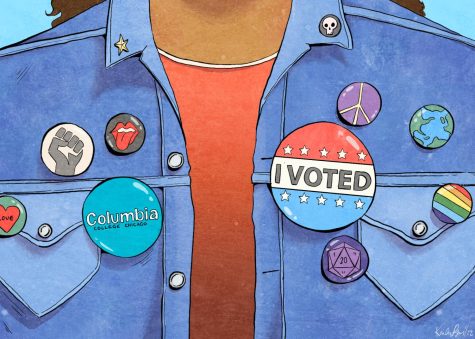Columbia makes honor roll as one of America’s Best Colleges for Student Voting
September 22, 2022

Columbia has made its way onto a nationally recognized list of best colleges in the country for student voting; this recognition of voter turnout is due to the work of Columbia Votes, a campus initiative to increase student voter participation.
Columbia Votes received its latest acknowledgement for its work in August from Washington Monthly, which included Columbia on its list of America’s Best Colleges for Student Voting. The magazine called the increase in student voting nationwide between 2016 and 2020 “one of the most striking shifts among any demographic.”
Referring to its listing as an “honor roll” of schools doing the best job of turning students into citizens, the magazine said it relied on data collected by the National Study of Learning, Voting and Engagement, or NSLVE, at Tufts University’s Institute for Democracy and Higher Education, which included 230 schools across the country, such as Harvard and Princeton universities.
In order to be recognized on the rankings, each school had to submit 2020 and 2022 voter action plans to the ALL IN Campus Democracy Challenge and have signed up to receive data from the NSLVE while showing repeated commitment to the effort of campus voter registration and turnout.
Carolina Ayala, creative writing senior and a voter registration genius with Columbia Votes, has worked to educate and register students to vote for over a year now, and said this type of recognition gives them a greater perspective on the impact their work has made on campus.
“Sometimes at the end of a session we’ll have 50 [registration-related documents] to mail off, but then it’s gone and you kind of stop realizing how many people that was,” Ayala said. “To have the results that our school is now being recognized helps put into perspective all the work that we’re actually doing.”
Columbia Votes — a nonpartisan initiative created during the 2019 fall semester by Sharon Bloyd-Peshkin, a professor in the Communication Department — was intended to not only help ease the process of voter registration for students but also implement what she said is a “voter education, motivation and registration strategy.”
According to 2020 data from the Institute of Democracy and Higher Education, Columbia had a 71.8% voting rate in 2020, which was a 15.8% increase from 2016. The data was a combined statistic of the 87.7% registration rate and 81.9% voting turnout of those registered students.
Bloyd-Peshkin said Columbia, which is a college that educates students from all 50 states in the country, provides Columbia Votes with the opportunity to not only educate students on voting from their campus address, but also give them the option to vote from their home address as well.
“I should point out that Columbia Votes is 100% nonpartisan,” Bloyd-Peshkin said. “We’re not about any party or any politician. We don’t tell anybody how to vote, but we try to help them understand who makes the decisions that affects their lives, and therefore how to figure out who they want to have in those offices.”
The rankings also noted 127 schools of the 230 had a voter registration rate of 85% or more compared to only 16 schools that made that mark in 2021, indicating a major increase in student voter registration.
Dating back to 2016, Columbia saw 82.6% of its students register to vote, but only 67.8% of those students had gone to the polls to vote. While in 2018, 81.5% of students had registered and 51.5% of those registered students casted a ballot.
“Something that we try to bring to people’s attention is that candidates are not just a person who you vote for and they kind of do whatever, but they’re also people who make promises to their constituents, to their demographics,” Ayala said. “That’s what you’re voting for. It’s not quite the face or the name that you’re voting for. It’s what they’re promising to give you.”
The midterm elections are rapidly approaching on Nov. 8, Bloyd-Peshkin said, and historically citizens do not vote at the same rate in those races as they do in presidential elections. Still, Columbia Votes aims to educate students on the importance of voting during in November when state and local elections will also be held.
“We try to say a little bit about what [those running] do and why you might want to find out who’s on your ballot and who you want to vote for,” Bloyd-Peshkin said. “My hope during midterms is that we get more students voting in midterms than we typically do.”
Columbia voting registration geniuses will be visiting Big Chicago classes and Introduction to Visual Culture classes to help students register and will also be at the Student Center, located at 754 S. Wabash Ave., on Wednesdays from 11 a.m. to 1 p.m. and at pop-up registration sites at other campus activities.







